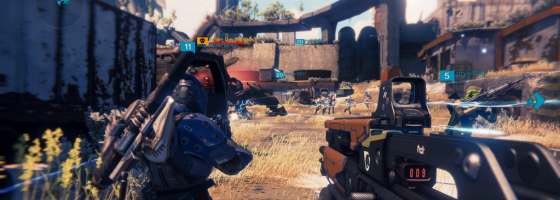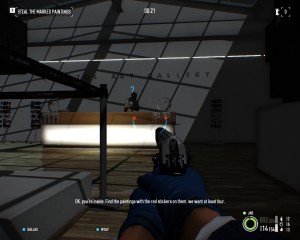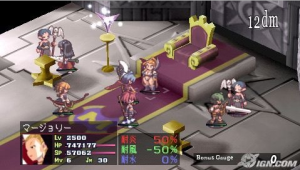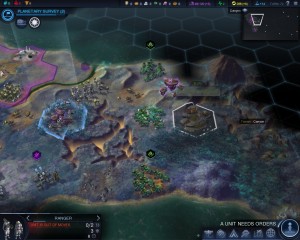Trending
Opinion: How will Project 2025 impact game developers?
The Heritage Foundation's manifesto for the possible next administration could do great harm to many, including large portions of the game development community.

Featured Blog | This community-written post highlights the best of what the game industry has to offer. Read more like it on the Game Developer Blogs or learn how to Submit Your Own Blog Post
Last week's post on Gamasutra regarding the cheating going on in Destiny was inspiration for this post taking a closer look at the difference between exploiting and cheating when it comes to game design.

A recent post on Gamasutra regarding the cheating that happened in Destiny raised a debate about whether or not the player base should be punished for using an exploit in game to cheat and get raid level content. The discussion turned to whether or not the player base was actively cheating or if they were merely using game systems in an optimized manner. The discussion of cheating vs. exploits can be confusing and is something that I want to discuss.

Destiny, originally posted on Gamespot.com
When it comes to designating something as a cheat or an exploit, I have a fairly simple system. For me, cheating is similar to hacking and I use the following definition:
Cheating -- When a player goes outside playing the game to alter, modify or change the experience of the game from the developer's original intent.
When it comes to altering the game through the use of mods, I know that there is a major grey area here when it comes to aesthetic or UI mods. Aesthetic is when the player may alter the textures of weapons, characters etc and may only be visible to the player using it. For these mods, I wouldn't consider them cheating as they don't impact playing the game.
UI however is when we run into another debate. If someone uses a UI mod that gives them an advantage compared to people using the default UI that could be considered cheating. The question comes in when players argue that an enhanced UI makes the experience more enjoyable for them and isn't changing the gameplay, but making it better for them.
In Payday 2, there is a popular mod called "HoxHud" that has been sweeping the game. The mod alters the in game UI to make hidden information visible and changes the HUD along with quality of life features. For some people, they feel that revealing information that the designers wanted hidden is an example of cheating. But there is the case for having a clearer UI and some of the quality of life changes from HoxHud actually became adopted by Overkill for Payday 2.

Payday 2
Payday 2's original UI was serviceable but many people prefer the enhancements that Hoxhud provides.I don't have a clear answer when it comes to Hoxhud, although I will say that I don't use it as the regular UI works for me.
But one area that is definitely black and white is the use of mods to alter in game files -- Aim-bots, unlock everything, skip levels, etc. These are examples of cheating no matter what and are frowned upon by game developers.
But when messing with the game occurs from within, we come to the topic of exploiting.
Exploits will be defined as the following:
Exploit: The player uses mechanics put in by the developer to circumvent the gameplay.
When it comes to exploits, there are two categories of usage to go over with the first being "breaking the game." I've talked about this in the past but breaking the game refers to using the mechanics in such a way that you find a strategy that completely dominates anything the game developer has put in.
We can see this in strategy titles where there is a dominant tactic that wins every time or games where one card/unit/item/weapon/etc is always the best option. In these situations the exploiting is due to the developer not figuring out all the possible consequences of their design and the player using that to their advantage. For single player games, these kinds of exploits are up to the designer's discretion when it comes to fixing them.

Disgaea originally posted on ign.com
Exploiting can occur when a player figures out the best way to circumvent the challenge of the game without having to resort to altering the game.The second type of exploit is when the players discover a bug in the game's programming that can be used to get around content.
Some examples would be using rapid jumping to get around invisible walls or finding shortcuts around obstacles in a variety of games.
Going back to Payday 2 there is a very popular exploit which involves duplicating items. What happens is that if everyone in your group picks up an item at the same time by using the timer at the top of the screen, you can duplicate the item four ways. For levels involving key cards, this will allow you to circumvent the need for drilling open doors or accessing special areas.
As you can see, these are examples of players getting around the developer's intent much like with cheating. However in these situations the players are simply using mechanics and content provided by the game developer and don't have to go outside of the experience of playing the game.
Because exploiting is within the game, it raises the debate as to what the developer should do about it. Again, the player is technically not doing anything wrong or modifying the game in any way to give them an unfair advantage. But in the same breath the developers have left their code or design in such a way that makes it possible to get around their game.
This is one of those grey areas as many players feel that exploiting the systems like breaking the game could be considered a reward for game mastery and should be left in.
Taking this back to Destiny and the recent exploit of having the host disconnect during the raid to leave the boss in a weaken state; I would have to call this cheating the system.
Even though the player is technically just using the commands and controls available to them like with an exploit, they are knowingly using a problem with the net code which is messing with game files and therefore is cheating the game. There isn't any mastery going on or the players being clever to figure out an unorthodox solution, they are simply messing with the game to get an advantage.

Beyond Earth
exploiting only works if there are advanced mechanics for the player to discover such as in strategy games. Simply messing with the game to get an advantage can be considered cheating.One question I know that plenty of people are asking is what should Bungie have done regarding the people who did this intentionally? Considering how quickly it was discovered, it should have been patched or at least been given an official statement.
However, taking so long to render judgment left it up to the player's discretion which meant that they were going to use it. Granted it would take time to spot the problem and figure out what's going on, but within the first week there should have been a statement issued.
So with that said even though I'm not a fan of cheating in a game, it's not fair to punish the fan base for Bungie's poor response time. This is similar to when there is a bug on a digital store that gives a game a discounted price or even for free that is fixed within minutes, but people still managed to get the added discount. While the store lost money and made a mistake, you can't punish the consumers for something that you did.
If this situation happens again in the future and Bungie says immediately: " Anyone caught doing X will be banned while we are fixing it," then it would be a different story.
In the end it's up to the game developers themselves to decide when it comes to their community messing with the game. Sometimes like with the Hoxhud example it can lead to the developer making changes that benefit everyone while the Destiny example showcases the damage of not reacting quickly enough.
One thing is for sure, staying quiet on these matters is never a good sign and as the creators of the game, you as the game developer must render a verdict on these matters. While you will piss off some of your community, you are still responsible for your content and playing dumb is never a wise choice as one bad response can come back to haunt you if there are future situations to deal with.
(For more posts on game design and the industry along with weekly podcasts, check out Game-Wisdom)
Read more about:
Featured BlogsYou May Also Like